
Compiled by Dona Senara
A DELICATE DANCING ACT
Ashan Jayatilaka presents the must-haves in corporate communications

Q: What are the key characteristics of an effective corporate communications team?
A: Communications is essential to operate businesses effectively. It goes beyond public relations and plays a strategic advisory role with the C-suite – especially in relation to reputational impact. Businesses are realising the benefits of redesigning this team as a value adding, strategic business partner.
A comms team, operating at its optimum, begins with a clear channel to the CEO. This ensures that goals are aligned with business priorities and an enterprise view is maintained.
Communications was traditionally grouped together with either marketing or human resources. Though there are similarities and overlaps, each has its distinct value propositions and deliverables.
Without proper access and alignment to C-suite executives, communications teams may find themselves gridlocked. Autonomy, authority and access to the boardroom are required to unleash the team’s potential.
An effective comms team navigates the complexities of messaging stakeholders with customised and relevant content on multiple fronts.
In critical situations, crisis response protocols may be activated, demanding an agile comms team that’s capable of swiftly addressing issues such as correcting facts with the ultimate objective of shaping positive perceptions in society.
Strong governance in terms of performance measures such as brand equity, earned media value, social media metrics and employee engagement scores will be in place.
Q: What does an average day on the job feel like?
A: When someone asks the inevitable question – ‘So what do you do for a living?’ – and you reply that you’re in ‘corporate communications,’ get ready to receive a blank stare of confusion.
They don’t know that we are out there captivating, inspiring and helping to shape perceptions, by crafting stories that are relevant, focussed and simple.
In the comms world, every day is filled with adventure – with remarkable new experiences. In recent months, we engaged media on a luxurious cruise ship in the south of the country, and travelled to the remote northeast to collect stories from villagers whose lives were transformed by a community-led sustainability project.
We dive headfirst into supporting the critical initiatives of our companies such as the quarterly CEO’s Forum performance updates, the grand 50th anniversary celebrations, an inaugural brand conclave and an epic pitch that swept a client off its feet in Europe – a potential industry game changer.
It is truly rewarding to share the extraordinary stories of teams across platforms and highlight the remarkable work they do. Digital and marketing teams must work closely with comms so that their inspiring narratives can come to life.
Q: How do you ensure consistent messaging across different communication channels and platforms?
A: It’s important to maintain a cohesive and unified voice by establishing well-defined content pillars that reflect the organisation’s unique corporate identity and serve as the foundation for all communications efforts.
Centralised branding and tonality guidelines must be communicated and upheld throughout the organisation. Whenever other teams, external stakeholders or partners generate content, a collaborative approach should be in place where the comms team plays a consultative role to review and clear what is submitted.
Furthermore, spokespeople and employee ambassadors should be equipped with a thorough understanding of the key details that matter. Providing them with talking points and conducting pre-event leadership briefings can help ensure that the corporate presents itself confidently and consistently.
Q: What are the requisite qualities to pursue a career in this profession?
A: Success in comms is a delicate dance of art, professionalism and strategy.
Due to a uniquely diverse set of tasks, the ability to plan and prioritise effectively is vital. The job often requires individuals to manage multiple fronts simultaneously – and this calls for diligence, dedication and a will to contribute.
Smart decision making and finding different ways to address challenges is imperative. Interpersonal skills – including the ability to build a rapport with everyone in the organisation – also count.
Excellent language skills, and the ability to convey messages clearly, concisely and accurately, are important. While each member may possess different technical skills, the team must collectively possess complementary abilities to achieve cohesive results.
Q: And what should professionals watch out for in the ever-changing comms landscape?
A: It appears that many of today’s sensational memes lack information integrity. Whether driven by ignorance or malice, this phenomenon poses a challenge for individuals and organisations.
Given the rapid proliferation of social media, it’s wise to keep a vigilant eye on evolving legislation in this domain.
While leveraging technology can greatly enhance communications efforts, it’s crucial to exercise caution. The human touch of creativity and judgement remains essential in evaluating AI generated output.





